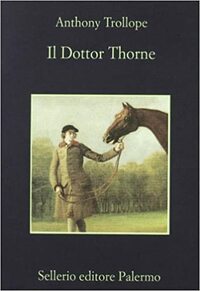Take a photo of a barcode or cover
It struck me that the entire oeuvre of PG Wodehouse is inspired by the opening chapters of Doctor Thorne, where a chumocracy of callow and unformed aristocratic youths are under the cosh of their ferocious and unrelenting aunts and mothers. Similarly, EM Forster’s Howards End is clearly massively indebted to Trollope in its social observation, comic situations, ironic tone, and authorial editorialising. Also in its somewhat uneven and imperfect structure and melodramatic plot.
Trollope’s psychological penetration and ear for dialogue is the best in the business. And ‘business’ for him it was, with his pace of 3000 words every day before breakfast (his manservant was paid overtime to bring him his first pre-dawn mug of coffee): sadly, to the detriment of his posthumous reputation. The panjandrums of Eng Lit are very taken with the ideal of artistic integrity, and this is where Trollope, however titanic his strengths, falls short. Doctor Thorne feels to me as if it requires a little bit of judicious editing and redrafting. Trollope preferred to cash his publisher’s cheque and to move on to the next book.
The political hustings episode at Courcy Castle feels like an intrusion from another novel - it just meanders away from the main plot and goes on too long. Trollope seems to throw in new characters willy-nilly as they suit his purposes and then drops them outrageously once their plot function has been served. A related problem is his inability to control point of view: it careers all over the place and seems to frequently distract the author. For instance, Caleb Oriel is introduced towards the very end of the novel because Trollope suddenly realises he can hang his conclusion of the main plot off the back of a Beatrice Gresham /Caleb Oriel wedding. I don’t object to that, but it would have been better if the reader had been prepared for both Caleb and a possible secondary romance plot earlier in the novel: just a few paragraphs or a small inciting incident at an appropriately early point would have sufficed. The pursuit of Caleb by the village spinsters is funny, but introduced far too late: it should have been threaded throughout the novel. Similarly, the characters of
Winterbones and Jonas are there primarily to dramatise the horror and pathos of their respective masters’ alcoholism - but once their masters succumb we never hear of them again. Jonas has caused considerable mayhem in Doctor Thorne’s household so he is a character with a (sub)plot which does need closure: Dickens, by comparison, was invariably scrupulous about tying off these loose ends.
These problems are emphasised by comparison with Trollope’s best practice: The introductions of both Scatcherd and Miss Dunstable are handled terrifically well. Both are somewhat stock narrative types. Miss Dunstable is first spoken of as a desirable target for young Frank’s mercenary matrimonial project as directed by his aunt and mother. Young Frank is dragged kicking and screaming off to Courcy Castle to pay court to Miss Dunstable’s £200,000 under the injunction that “he must marry money”. Our first physical description of Miss Dunstable confirms she is a stock type: the unattractive aging heiress chased by suitors for her money. Trollope’s delicious surprise for the reader is when she speaks for the first time: she’s clearly highly intelligent, knows exactly why she is lionised by society, can see the fortune hunters a mile off and deals with them wittily, discreetly and with some compassion as circumstances permit. Young Frank’s initial inept attempts at flirtation are comical, but this then ripens into a surprising friendship between the two; one important to the plot as Miss Dunstable supports Frank in his struggle to marry Mary Thorne against his family’s rigid opposition. A non-romantically based friendship between the genders is unusual even today in literature: and this one was published in 1858. That Trollope successfully portrays one is a huge tribute to his originality, skill, and the depths of his psychological acuity.
Scatcherd is first told of in Mary’s back story, and seems a basic plot device at that point (a violent, impulsive and drunken labourer who kills Mary’s father for seducing his sister, Mary’s unmarried mother). In the early chapters, Trollope again teases the reader with hints as to what Scatcherd is now, and then finally confirms: he is Sir Roger Scatcherd, dynamic railway entrepreneur and aspiring politician and by far the richest character in the book. Once again, it is his dialogue which brings the character to life and makes vividly memorable. I wonder how much he influenced Dickens’s Magwitch in Great Expectations (a similar kind of plot) published three years later.
A modern reader expects the Victorian melodramatic plot: this one was given to Trollope by his brother (Doctor Thorne became his best-selling book to Victorian audiences). Today this is worth reading for the humour and characters and insight into the Victorian world. He’s great at both individual psychology and how individuals interact amongst themselves in varying social situations. The comic situations perhaps don’t quite reach the sublime heights of those featuring Mrs Proudie in Barchester Towers - but in compensation the author’s editorialising is funnier (if sometimes taken too far. This was the kiss of death for Henry James. On the whole, I’m amused). Trollope’s dialogue is sensational: what a loss he was to the theatre.
(Barchester Chronicles Book 3)
Trollope’s psychological penetration and ear for dialogue is the best in the business. And ‘business’ for him it was, with his pace of 3000 words every day before breakfast (his manservant was paid overtime to bring him his first pre-dawn mug of coffee): sadly, to the detriment of his posthumous reputation. The panjandrums of Eng Lit are very taken with the ideal of artistic integrity, and this is where Trollope, however titanic his strengths, falls short. Doctor Thorne feels to me as if it requires a little bit of judicious editing and redrafting. Trollope preferred to cash his publisher’s cheque and to move on to the next book.
The political hustings episode at Courcy Castle feels like an intrusion from another novel - it just meanders away from the main plot and goes on too long. Trollope seems to throw in new characters willy-nilly as they suit his purposes and then drops them outrageously once their plot function has been served. A related problem is his inability to control point of view: it careers all over the place and seems to frequently distract the author. For instance, Caleb Oriel is introduced towards the very end of the novel because Trollope suddenly realises he can hang his conclusion of the main plot off the back of a Beatrice Gresham /Caleb Oriel wedding. I don’t object to that, but it would have been better if the reader had been prepared for both Caleb and a possible secondary romance plot earlier in the novel: just a few paragraphs or a small inciting incident at an appropriately early point would have sufficed. The pursuit of Caleb by the village spinsters is funny, but introduced far too late: it should have been threaded throughout the novel. Similarly, the characters of
Winterbones and Jonas are there primarily to dramatise the horror and pathos of their respective masters’ alcoholism - but once their masters succumb we never hear of them again. Jonas has caused considerable mayhem in Doctor Thorne’s household so he is a character with a (sub)plot which does need closure: Dickens, by comparison, was invariably scrupulous about tying off these loose ends.
These problems are emphasised by comparison with Trollope’s best practice: The introductions of both Scatcherd and Miss Dunstable are handled terrifically well. Both are somewhat stock narrative types. Miss Dunstable is first spoken of as a desirable target for young Frank’s mercenary matrimonial project as directed by his aunt and mother. Young Frank is dragged kicking and screaming off to Courcy Castle to pay court to Miss Dunstable’s £200,000 under the injunction that “he must marry money”. Our first physical description of Miss Dunstable confirms she is a stock type: the unattractive aging heiress chased by suitors for her money. Trollope’s delicious surprise for the reader is when she speaks for the first time: she’s clearly highly intelligent, knows exactly why she is lionised by society, can see the fortune hunters a mile off and deals with them wittily, discreetly and with some compassion as circumstances permit. Young Frank’s initial inept attempts at flirtation are comical, but this then ripens into a surprising friendship between the two; one important to the plot as Miss Dunstable supports Frank in his struggle to marry Mary Thorne against his family’s rigid opposition. A non-romantically based friendship between the genders is unusual even today in literature: and this one was published in 1858. That Trollope successfully portrays one is a huge tribute to his originality, skill, and the depths of his psychological acuity.
Scatcherd is first told of in Mary’s back story, and seems a basic plot device at that point (a violent, impulsive and drunken labourer who kills Mary’s father for seducing his sister, Mary’s unmarried mother). In the early chapters, Trollope again teases the reader with hints as to what Scatcherd is now, and then finally confirms: he is Sir Roger Scatcherd, dynamic railway entrepreneur and aspiring politician and by far the richest character in the book. Once again, it is his dialogue which brings the character to life and makes vividly memorable. I wonder how much he influenced Dickens’s Magwitch in Great Expectations (a similar kind of plot) published three years later.
A modern reader expects the Victorian melodramatic plot: this one was given to Trollope by his brother (Doctor Thorne became his best-selling book to Victorian audiences). Today this is worth reading for the humour and characters and insight into the Victorian world. He’s great at both individual psychology and how individuals interact amongst themselves in varying social situations. The comic situations perhaps don’t quite reach the sublime heights of those featuring Mrs Proudie in Barchester Towers - but in compensation the author’s editorialising is funnier (if sometimes taken too far. This was the kiss of death for Henry James. On the whole, I’m amused). Trollope’s dialogue is sensational: what a loss he was to the theatre.
(Barchester Chronicles Book 3)
Although a little more conventional than the prior books in the barsetshire chronicles, this was lovely, witty and an absolute joy to read.
Trollope is great in the way he designs his characters and developes them throughout the story. How my opinion if Frank and tge love story has changed as the book went on is probably my favorite thing about it.
I would have liked there to be a stronger link to the previous novels, but it never really bothered me and I soon stopped to compare it to Barchester Tower and The Warden, which are more about politics and less about love than this one.
While the ending was a little more convenient than I would have expected from Trollope, the plot was engaging and included everything I like about victorian literature.
Trollope is great in the way he designs his characters and developes them throughout the story. How my opinion if Frank and tge love story has changed as the book went on is probably my favorite thing about it.
I would have liked there to be a stronger link to the previous novels, but it never really bothered me and I soon stopped to compare it to Barchester Tower and The Warden, which are more about politics and less about love than this one.
While the ending was a little more convenient than I would have expected from Trollope, the plot was engaging and included everything I like about victorian literature.
This is the third volume in the famous Chronicles of Barsetshire but can be read independently.
The story takes place in higher society on the English countryside and deals with the Gresham Family who are seriously in debt and therefore it is, in the eyes of his parents, that the heir, Frank Gresham, must marry money. He is however in love with Mary, the adopted daughter of the family practitioner, Doctor Thorne, who has no money.
Like Jane Austen novels, this is very much a story about marriage of the heart versus marriage of reason. It is also a novel about social class and about alcoholism, which plays a central role in a major part of the book.
I was surprised right at the first chapters because Trollope does something extraordinary: before the real story begins he addresses the reader directly several times. He asks the reader for patience when he first writes an account of the background of the main characters and he even gives the reader a choice as to who the hero of the story will be: Doctor Thorne or young Frank Gresham. Later on in the book he does it again when he asks the reader directly what he or she thinks of the then new railways or the steam-driven machines. I thought this was brilliantly done.
The writing itself is very bright and lively, there is much wit (a medical practitioner who is rather old fashioned is called Docter Fillgrave) and it is quite easy to read.
The characters are great. It has I think the most handsome male protagonist in Victorian literature, Frank Gresham, and his mother, the forever scheming Lady Arabella is one of my all time favorite characters who made me laugh because of her silly actions.
I absolutely loved this book and intend to read more Trollope in the future.
The story takes place in higher society on the English countryside and deals with the Gresham Family who are seriously in debt and therefore it is, in the eyes of his parents, that the heir, Frank Gresham, must marry money. He is however in love with Mary, the adopted daughter of the family practitioner, Doctor Thorne, who has no money.
Like Jane Austen novels, this is very much a story about marriage of the heart versus marriage of reason. It is also a novel about social class and about alcoholism, which plays a central role in a major part of the book.
I was surprised right at the first chapters because Trollope does something extraordinary: before the real story begins he addresses the reader directly several times. He asks the reader for patience when he first writes an account of the background of the main characters and he even gives the reader a choice as to who the hero of the story will be: Doctor Thorne or young Frank Gresham. Later on in the book he does it again when he asks the reader directly what he or she thinks of the then new railways or the steam-driven machines. I thought this was brilliantly done.
The writing itself is very bright and lively, there is much wit (a medical practitioner who is rather old fashioned is called Docter Fillgrave) and it is quite easy to read.
The characters are great. It has I think the most handsome male protagonist in Victorian literature, Frank Gresham, and his mother, the forever scheming Lady Arabella is one of my all time favorite characters who made me laugh because of her silly actions.
I absolutely loved this book and intend to read more Trollope in the future.
Poor Frank Gresham MUST MARRY MONEY! The Squire of Greshamsbury is embarrassed (financially) and it is up to young Frank to save the family estate.
But Frank is in love with the very sweet, kind, and dear Mary Thorne. And Mary is the poor niece of a poor country doctor. And although everyone loves Mary, Frank MUST MARRY MONEY!
How we get from this state, the the "happily ever after" state is plot of this third book in Trollope's Barsetshire Series.
It's a good book, but it could easily have been a LOT shorter. Trollope is an excellent writer, but this is the first time in one of his books that I ever wished he wrapped it up.
But Frank is in love with the very sweet, kind, and dear Mary Thorne. And Mary is the poor niece of a poor country doctor. And although everyone loves Mary, Frank MUST MARRY MONEY!
How we get from this state, the the "happily ever after" state is plot of this third book in Trollope's Barsetshire Series.
It's a good book, but it could easily have been a LOT shorter. Trollope is an excellent writer, but this is the first time in one of his books that I ever wished he wrapped it up.
Probably closer to 4.5 stars but I just enjoyed the hell out of this and even though the last couple of chapters felt like a very long windup, I can't say I minded particularly. I like spending time with Trollope's people, I like that he doesn't spend his time trying to set up elaborate plot twists (in fact, quite the opposite, the moment that you think a plot twist is about to happen, he announces the result and makes the whole question of twists null and void). Which lets us concentrate on how they do what they do and why they do what they do in a manner that I find both soothing and fascinating in equal turns.


